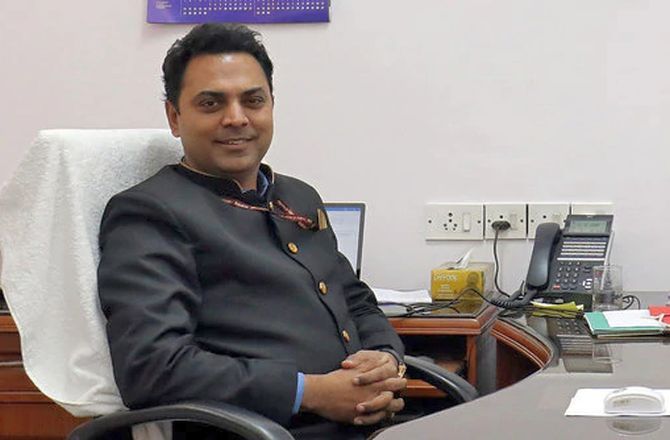Chief Economic Adviser (CEA) K V Subramanian on Tuesday exuded confidence that India would achieve double-digit growth in the current financial year on the back of policy initiatives and continuing reforms.

He also said the country is well poised to meet the fiscal deficit target of 6.8 per cent of GDP.
"At this stage, I can say confidently that we should be able to achieve that fiscal deficit number.
"Any shortfalls that might happen on the disinvestment side will also be accompanied by positive surprises that have happened on tax revenue," he told reporters.
The government estimates fiscal deficit at 6.8 per cent of the gross domestic product (GDP) for the current financial year ending on March 31, 2022.
Subramanian, who would be demitting office after completing his three-year stint next month, added, "India is likely to have double-digit growth this year.
"The overall growth for the first half has been 13.7 per cent, so even a little more than 6 per cent growth in the subsequent quarters should be able to deliver double-digit growth for this year."
India's GDP growth stood at 8.4 per cent in the second quarter of 2021-22, with the economy surpassing the pre-COVID level, official data showed on Tuesday.
The Economic Survey 2020-21, released in January this year, had projected GDP growth of 11 per cent during the current financial year ending March 2022.
The Survey had said growth will be supported by supply-side push from reforms and easing of regulations, infrastructural investments, boost to manufacturing sector through the Production-Linked Incentive (PLI) schemes, recovery of pent-up demand, increase in discretionary consumption subsequent to rollout of vaccines and pick up in credit.
"We are projecting 6.5-7 per cent (growth) next year and thereafter 7 per cent plus over different scenarios.
"I think the impact impact of seminal second generation reforms will unfold in terms of both investment and in productivity going forward," he said.
With regard to the impact of the new coronavirus variant Omicron, he said it is too early to comment.
He, however, said the impact would be less than the first wave as the government already has experience of handling two waves of the pandemic.
"Given that we are still amidst pandemic and the Omicron variant seems to have actually created some concern, we are all waiting for evidence to come on how infectious would it be, and how debilitating would it be as well compared to the Delta variant," he said.
Asked about the impact of repeal of three farm laws on the reforms process, the CEA said it should not affect reforms in other sectors.
"In a democracy like ours, political economy matters a lot and I think it is a fact that the way agriculture generates emotion other sectors do not.
"Therefore, extrapolating anything that you are seeing in agriculture, be it reforms or otherwise, on to other sectors...I would not recommend, because the dynamics are quite different," he said.
Parliament on Monday passed a bill to repeal the three contentious agricultural laws at the centre of protests by farmers for over a year, with the Lok Sabha and the Rajya Sabha giving their approval in quick succession amid an uproar.
The government scrapped the three laws which were passed by Parliament in September last year.
Prime Minister Narendra Modi had announced on November 19 that the three farm legislations -- Farmers' Produce Trade and Commerce (Promotion and Facilitation) Act; The Farmers (Empowerment and Protection) Agreement of Price Assurance and Farm Services Act; and The Essential Commodities (Amendment) Act -- will be repealed.
Photograph: Anushree Fadnavis/Reuters











 © 2025
© 2025